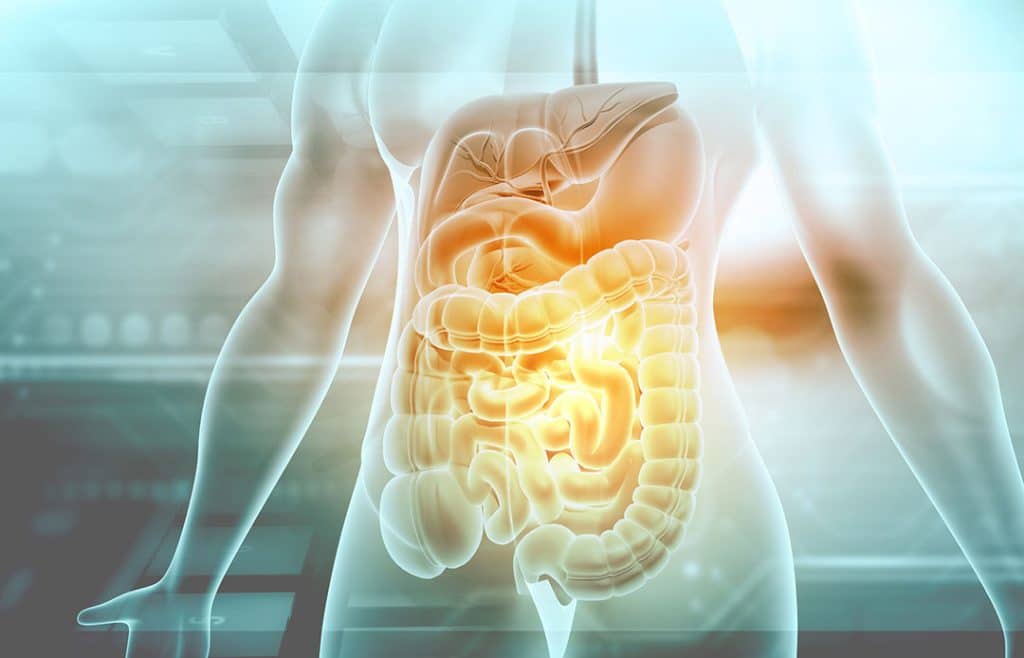Gut health is more than digestion. It’s the key to combating nutrient deficiencies for all ages.
Whether you’re a wellness aficionado or just starting on the path to healthy living, you’ve probably heard the term, “gut health.”
The focus on gut health as the crux for whole-body health has taken the world by storm over the past few years. But, the concept isn’t new. Even thousands of years ago, our ancestors knew how important food and digestion were to our health – as well as how imbalances in the gut were often at the root of seemingly unrelated health issues.
Today, the quest for a balanced gut microbiome continues. But what exactly is gut health, and what can you do to improve yours?
What is Gut Health?

The term “gut” typically refers to the gastrointestinal (GI) system, a complex network of organs and tissues responsible for digesting the foods you eat and absorbing the nutrients to use as fuel. At its simplest, the gut includes the stomach, small intestine, and large intestine, where the majority of digestion and absorption processes occur.
Beyond these main organ systems, the gut is also home to trillions of microorganisms (collectively known as the gut microbiome) that support our digestion, immunity, mood balance, hormone balance, and more. The gut microbiome is teeming with diverse bacterial species, viruses, fungi, and other microorganisms, all working together in a symbiotic relationship. When this community is in balance, it can have profound effects on your overall health.
Why is Gut Health Important?
Today, it seems like everyone is talking about improving your gut or microbiome. But what does it mean to have good gut health?
In essence, gut health is a delicate equilibrium within this intricate ecosystem. It’s the optimal functioning and balance of both the digestive organs and the microbiome.
The truth is, your gut is much more than just a digestive system. It plays a pivotal role in maintaining your overall health and well-being, influencing everything from your energy levels to your mental state. Here are just a few of the ways your gut supports your overall well-being:
Obtaining Energy from Food
The primary function of the gut is to break down the foods you consume, extracting essential nutrients and converting them into energy your body can use to function. When your gut is working well, it processes food efficiently and ensures you get the maximum benefit from your meals. A healthy gut also helps keep you energized throughout the day and can prevent issues like fatigue and sluggishness.
Digestive Comfort and Weight Management
Of course, one of the main roles of the gut is to digest food. Good gut health means your body will work as a well-oiled machine, and you’ll experience fewer digestive issues such as bloating, gas, and irregular bowel movements. There’s also evidence to suggest that good gut health makes it easier to achieve and maintain a healthy weight.
Detoxification Support
One function of your gut is to act as a filter for toxins and waste. A well-functioning digestive system eliminates harmful substances from your body, preventing them from accumulating and causing health issues. By supporting your gut health, you enhance your body’s natural detoxification and elimination processes, which reduces your risk of toxin-related symptoms and diseases.
Immune System Support
Did you know that the majority of your immune system resides in the gut? The gut microbiome contains beneficial microorganisms that act as your body’s first line of defense against pathogens. That’s why cultivating a healthy gut microbiome is key to strengthening your immune system and reducing the likelihood of infections and illnesses.
Serotonin Production and Mood Balance
A significant portion of serotonin, the “feel-good” neurotransmitter, is produced in the gut. Serotonin plays a crucial role in regulating mood, anxiety, and stress levels. When your gut microbiome is balanced and flourishing, it supports the production of serotonin, contributing to a more positive mental state and overall well-being.
The Link Between Gut Health, Digestion, and Nutritional Deficiencies

As you can see, good gut health isn’t just about feeling good after a meal; it’s the very core of your well-being. So, what happens when your gut is struggling?
Gut Health and Digestion
Digestion starts in your mouth, but really gets going in your stomach and small intestine. Your gut plays the lead role here, breaking down food and absorbing nutrients. When your gut is in good shape, it efficiently processes what you eat, making sure your body gets the vitamins, minerals, and energy it needs.
But here’s the catch: When your gut isn’t in balance, digestion can go haywire. You might experience bloating, gas, or constipation. In severe cases, you may develop gut conditions like IBS or Crohn’s Disease.
You’ll likely also experience fatigue and nutrient deficiencies. Even the healthiest foods won’t do you much good if your gut can’t absorb them properly.
Gut Health and Nutritional Deficiencies
Your body relies on the nutrients it gets from food to function correctly. If your gut isn’t absorbing those nutrients properly, you can’t function properly.
Nutrient deficiencies can cause countless different symptoms. But, some of the most common signs of poor gut health are fatigue, unexplained weight loss or gain, and skin issues.
So, how does poor gut health lead to nutrient deficiencies? The lining of your small intestine is covered in tiny finger-like projections called villi, which are responsible for nutrient absorption. However, when the gut is inflamed or damaged, these villi can become compromised, which reduces their ability to absorb nutrients effectively.
Imbalances in the microbiome can also lead to poor nutrient absorption. For instance, when you eat a high-sugar diet, harmful bacteria thrive, take over the gut, and overwhelm the beneficial bacteria. The good bacteria aren’t able to process your food as efficiently and you absorb fewer nutrients.
Gut Health and Leaky Gut Syndrome
Leaky gut syndrome, also known as increased intestinal permeability, is when the lining of your intestines becomes, well, leaky. Instead of being tight like a strong fence, it develops gaps, allowing particles to sneak into your bloodstream when they’re not supposed to.
Why is this an issue? Your body senses these wayward particles as a threat and triggers an inflammatory immune response. Over time, the immune system becomes overworked, which can lead to poor immunity or autoimmune conditions.
Common Signs of Poor Gut Health
Wondering if your wellness woes are related to your gut? Because the gut is linked to so many different body systems and functions, it can be a hidden culprit at the root of many frustrating symptoms. Here are some of the most common issues that are often linked to poor gut health:
- Digestive upset: Frequent bloating, gas, diarrhea, or constipation can be clear indicators of an unhappy gut.
- Food intolerances: Developing new food sensitivities or intolerances to certain foods, such as dairy or gluten, might suggest an issue with your gut’s ability to process them.
- Unexplained weight changes: Sudden weight loss or weight gain without a clear reason can be associated with imbalances in the gut microbiome.
- Fatigue: Feeling tired all the time, even after a good night’s sleep, could be a sign of nutrient malabsorption due to poor gut health.
- Skin conditions: Conditions like acne, eczema, or psoriasis might be linked to an imbalanced gut.
- Low mood: Gut health is closely tied to mental health. Anxiety, depression, mood swings, and increased stress levels can be influenced by an unhealthy gut.
- Autoimmune issues: Certain autoimmune diseases, such as rheumatoid arthritis or lupus, may be exacerbated or triggered by gut imbalances.
- Constant bad breath: Chronic bad breath that doesn’t improve with oral hygiene could be a sign of digestive issues.
- Frequent infections: A weakened immune system due to poor gut health can make you more susceptible to infections like colds and flu, allergies, sinus infections, slow-healing wounds, and yeast infections.
- Dry, brittle hair and nails: A lack of key vitamins and minerals in your diet can result from poor nutrient absorption in the gut, leading to symptoms like weakness or brittle nails.
- Pain: Conditions like joint inflammation or arthritis may be linked to inflammation caused by an unhealthy gut, as can issues like migraines and fibromyalgia.
Remember that these signs alone don’t necessarily mean you have poor gut health – they are just potential indicators that it’s time to pay attention to your digestive system. If you’re experiencing several of these symptoms regularly, it may be time to consult your AlignLife chiropractor or functional nutritionist to assess and address your gut health.
How to Improve Gut Health Naturally
Gut health is the foundation for whole-body health. Let’s dive into the practical steps you can take to enhance your gut health naturally.
Top Foods for Gut Health

The foods you eat have a major impact on your gut health, and you have at least three opportunities per day to fuel your gut with healthy foods. Let’s start with some of the top foods to include in your diet for optimal gut health:
Fiber-Rich Foods
Fiber is your gut’s best friend. It feeds the beneficial bacteria in your microbiome and ensures the elimination process moves smoothly. Incorporate foods like whole grains, oats, beans, lentils, and plenty of fruits and vegetables into your meals.
Probiotic and Fermented Foods
Probiotic and fermented foods contain live beneficial bacteria that can help balance your gut microbiome. Examples include yogurt (with live cultures), kefir, sauerkraut, kimchi, and kombucha.
Fermentation not only preserves food but also enhances its probiotic content. Add fermented foods like miso, tempeh, and pickled vegetables to your diet to boost your microbiome.
Prebiotic Foods
Prebiotics are food or fuel for probiotics. They promote the growth of beneficial bacteria in your gut. Foods like garlic, onions, leeks, asparagus, and bananas are rich in prebiotics.
Omega-3 Fatty Acids
Healthy fats are your friend when it comes to gut health. Omega-3s, found in fatty fish (salmon, mackerel), flaxseeds, and walnuts, help reduce inflammation in the gut and promote a more balanced microbiome.
Bone Broth
Bone broth is made by simmering animal bones and connective tissue. The resulting nourishing broth is high in collagen, which can soothe the gut lining and may aid digestion and skin health.
Herbs and Spices
Not only do herbs and spices make your food more flavorful, but they tend to contain nutrients that support gut health. Turmeric, ginger, garlic, rosemary, paprika, and cinnamon are great spices to start with, as they have anti-inflammatory properties and can be beneficial for gut health.
Top Gut Health Supplements

While diet change is crucial to improving your gut health, certain supplements can help you make bigger strides in less time. Here are some of the key supplements for better gut health:
Probiotics
Probiotics are live beneficial bacteria that can help restore the balance of your gut microbiome. They enhance digestion, boost immunity, and may alleviate digestive discomfort. Try Aceva Ultrabiotic, which focuses not just on how many bacteria are in each dose, but on bacteria quality, age, and strain research for optimal results.
L-Glutamine
L-glutamine is an amino acid known for its ability to support gut health. It helps maintain the integrity of the intestinal lining, potentially reducing the risk of a leaky gut. It also supports protein digestion, immune function, and energy production.
Omega 3
Omega-3 fatty acids have anti-inflammatory properties that can reduce gut inflammation. While you can get them through your diet, it can be challenging to get enough omega-3s to make a major impact on your gut health. That’s where Aceva Omega 3 Plus comes in. This supplement helps your body reach optimal levels of essential fatty acids in a burp-free, easy-to-swallow fish oil capsule.
Gut Reactions Bundle
The root of your gut health issues isn’t always easy to pinpoint with one supplement. When you’re feeling out-of-sorts, the Aceva Gut Reactions bundle can help rebalance your gut with a multifaceted approach.
- Candeva balances the microflora in your gut by managing and eliminating the bacterial and fungal overgrowth that often results from high-carb, high-sugar diets.
- Gastro Plus helps your body restore low stomach acid levels and create a more sterile environment in your gut to prevent acid reflux and poor digestion.
- Ultrabiotic replenishes your gut with quality probiotics that actively work to restore your microbiome balance and support your gut lining.
Lifestyle Tips for Gut Health

Beyond diet and supplements, there are many ways you can improve your gut health simply by adjusting your lifestyle habits.
Stay Hydrated
Drinking plenty of water is essential for digestion and maintaining the mucus lining of your intestines.
Reduce Stress
Chronic stress can negatively impact gut health. Incorporate stress-reduction techniques like mindfulness, yoga, or meditation into your daily routine.
Exercise
Physical activity can promote a healthy gut by enhancing circulation and reducing inflammation. Try these fall exercises to get you moving.
Get Quality Sleep
Like the rest of your body, the gut needs sleep to heal and regenerate. Aim for 7-9 hours of quality sleep per night.
Limit Antibiotic Use
While antibiotics are sometimes necessary, their overuse can disrupt the balance of gut bacteria. Use them only when prescribed by a healthcare professional, and be sure to replenish your system with quality prebiotics and probiotics after any antibiotic treatment.
Avoid Excessive Sugar
Sugar wreaks havoc on your digestive system by feeding harmful bacteria in the gut. This contributes to microbiome imbalances (like Candida overgrowth) that sabotage gut health. Reduce your refined sugar intake and satisfy your sweet tooth with naturally sweet treats (like fruit, dates, and dark chocolate).
Eat Mindfully
Take more time to chew your food thoroughly, and savor your meals. This improves digestion and allows your body to absorb nutrients more effectively.
Need Gut Support? Your AlignLife Chiropractor Can Help

From eating nourishing foods to taking key supplements to adopting gut-healthy habits, the power to improve your gut balance and function is well within your control.
But, if you’re struggling with frustrating symptoms, you may prefer a more streamlined approach to getting your gut in shape. That’s where AlignLife can help.
Chiropractic care is often associated with spinal adjustments and pain relief, but its benefits extend beyond musculoskeletal issues. Chiropractic care also has a positive impact on gut health by balancing your nervous system, reducing inflammation and tension in the gut, and promoting better overall balance. Plus, your AlignLife chiropractor and functional nutritionist can help you identify and overcome the root causes of your gut health issues, as well as help you set up healthy habits that work for your lifestyle.
Prioritizing gut health paves the way to a healthier, more energetic, and happier you. Take a step in the right direction today, and schedule a visit at your local AlignLife team to get the support you – and your gut – need to thrive.



